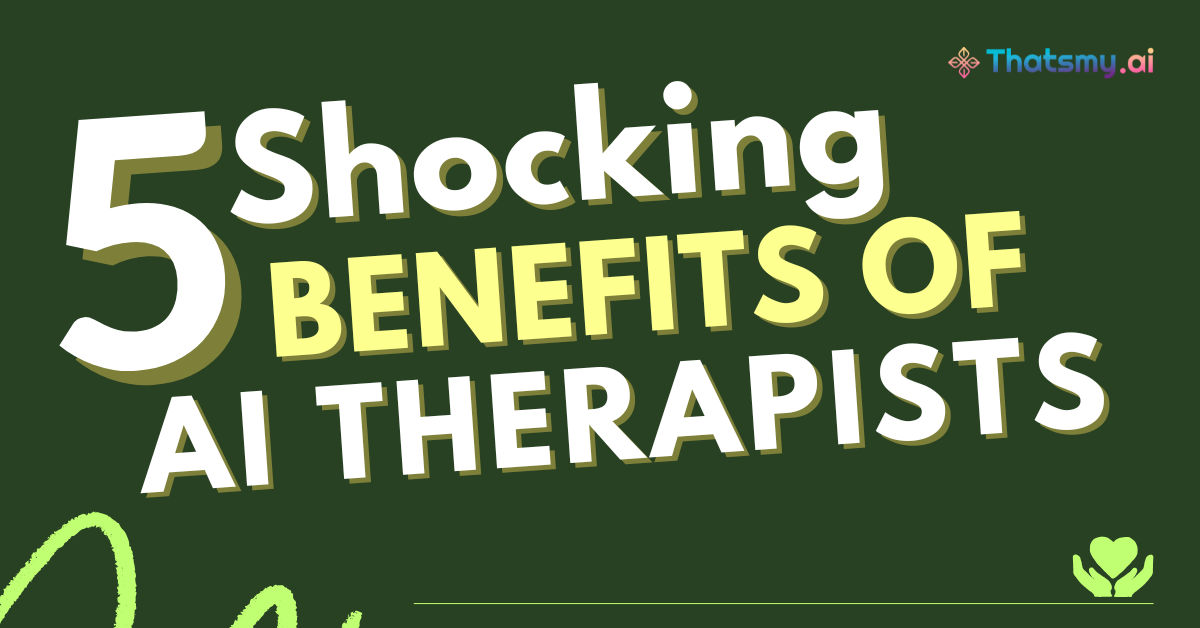This blog highlights how AI therapist apps make mental health care more accessible, affordable, and private. Unlike traditional therapy, they offer 24/7 support, anonymity, and tailored interventions.
Apps like Wysa and Woebot provide judgment-free spaces, while Youper and Sintelly deliver affordable resources. With instant availability and personalized care, these AI tools empower users to take charge of their mental well-being.
Explore the benefits of AI therapists and how they’re revolutionizing mental health support for modern lives.

Let's be honest—traditional therapy doesn't work for everyone. For a lot of people, opening up to a stranger can be scary or awkward. High costs, mental health stigma, and finding time to schedule an appointment are all big barriers. These challenges can prevent people from accessing the support they need.
That's where AI therapist apps come in. These AI tools make mental health support easier, more flexible, and much more affordable. It can bridge the gap for people who want support but feel restricted by the limitations of traditional therapy.
With these AI Chatbots, people who may shy away from traditional therapy can find a new pathway to emotional well-being. The convenience, privacy, and personalized approach that AI apps offer make them an excellent choice for many seeking mental health support without the hurdles.
Privacy is a big worry when it comes to therapy. Many people are afraid of being judged or having their confidentiality breached. Sharing personal thoughts with another person can feel overwhelming.
AI therapy apps like Wysa and Woebot offer a safe, anonymous alternative. You can talk to these AI companions without fear of judgment or privacy breaches—just a supportive, virtual listener. This level of anonymity helps users express themselves freely and honestly.
Knowing there is no human on the other end makes it easier to open up. This comfort allows people to explore feelings and work towards better mental health.
For those uncomfortable with in-person therapy, AI therapists provide a way to address mental health issues without crossing that emotional barrier, creating a layer of safety that makes taking the first step easier.
Affordable AI Mental Health Support for Everyone
Let's talk about money—traditional therapy can be expensive. High session fees and limited insurance coverage can make it too costly for many people, keeping them from getting the help they need.
AI therapist apps provide an affordable, and sometimes even free, alternative. Platforms like Youper and Sintelly offer mental health resources at a fraction of the cost of traditional therapy, or even for free. This makes emotional support accessible to a wider audience.
These free mental health apps offer practical support without financial strain, letting users get help whenever they need it. By making mental well-being more accessible, AI therapist apps give everyone a chance to get support.
Scheduling conflicts are another common roadblock. Finding a time that works with your busy schedule can be frustrating. Waiting days or weeks for an appointment is especially hard when you need help right away. Sometimes we need support right now, but traditional therapy often means planning and waiting.
AI therapist apps such as InfiHeal and Woebot eliminate the waiting game. They offer round-the-clock support, letting you connect whenever you need—whether it’s 3 AM or during a lunch break. This kind of on-demand support puts you in control of when and how you engage with your mental health.
Accessing support instantly can be life-changing. Whether you're feeling anxious late at night or need motivation, these AI chatbots are always there. You can rely on them when you need someone to listen. They fit into your life whenever you need them, giving you the freedom to work on your mental health without scheduled appointments.
This kind of accessibility also allows for more consistent mental health care. Instead of waiting until a weekly session, users can check in whenever they feel the need, allowing for more proactive care that fits seamlessly into their lifestyle.
Traditional therapy can feel like a one-size-fits-all solution. What works for one person might not work for another. Therapists often use the same methods, but everyone's mental health journey is unique.
AI therapist apps like Wysa and Youper take a more personalized approach. These apps use AI to tailor interventions based on your specific needs, offering customized exercises and feedback. This means that your mental health journey is shaped by your experiences. It adapts as you grow, making the support more relevant and effective for you.
The more you use these apps, the more they learn about your preferences, challenges, and emotional state. This adaptability leads to a personalized experience that evolves with you.
Whether you're feeling anxious, stressed, or need motivation, AI apps adjust their responses. They provide what you need in that moment. It’s a dynamic process that ensures you are getting the support that is most beneficial for your current state of mind.
By providing personalized care, these apps help users feel more understood and supported. It's not just about generic advice—it's about creating an experience that fits you, making the journey to ai and mental health more effective and empowering.
Opening up in face-to-face sessions can be hard. There's a lot of anxiety about how someone else might see your feelings, or the fear of being misunderstood. This fear often acts as a significant barrier, especially for those dealing with issues like social anxiety or low self-esteem.
AI therapist apps like Sintelly and InfiHeal provide an opportunity to share your thoughts in a truly non-judgmental space. No facial expressions to interpret, no awkward silences—just a comfortable environment where you can take your time exploring your emotions without pressure. This makes the experience of engaging with your mental health far less daunting.
These apps allow you to be as open as you need to be, without fear of being judged or misunderstood. You can take as long as you need to articulate your thoughts and feelings, or explore different exercises at your own pace.
This flexibility and comfort can make a big difference. It allows users to work on their mental health without the emotional barriers of traditional therapy.
By creating a space where users feel comfortable, AI therapist apps help people be more honest. This reflection is an important part of healing. It’s about finding a way to feel safe, heard, and supported—all from the privacy of your own home.
Woebot: This AI chatbot uses cognitive behavioral therapy (CBT) techniques and mood tracking to help you navigate emotional challenges. With Woebot, you get practical strategies to improve your mood, all delivered in a conversational and friendly manner.
Youper: Offers mood tracking and personalized mindfulness exercises, adapting to your needs in real time. Youper uses AI to help you understand your emotions better and provides practical activities to boost your mood and resilience.
Wysa: Provides empathetic support using evidence-based mental health exercises that help with anxiety, stress, and more. Wysa offers a combination of AI support and optional human coaching for a comprehensive mental health solution.
InfiHeal: Focuses on building emotional resilience with therapeutic exercises that strengthen your mental well-being. InfiHeal provides an array of guided exercises and meditations to help you build stronger emotional coping skills over time.
Sintelly: Uses CBT and interactive support to offer tailored guidance and help users improve their mental health journey. Sintelly helps you work through challenging thoughts with simple yet effective cognitive strategies.
A question many have is: Are these AI apps as effective as seeing a human therapist? Research indicates that AI therapy apps can effectively reduce symptoms of depression and anxiety.
While they might not fully replace human therapists for complex cases, they can be a powerful supplementary tool. These AI apps help bridge the gap for those who need immediate support or who are not yet ready to see a therapist.
Another important concern is data security. Reputable AI therapist apps use strict data protection protocols, keeping your information safe and ensuring confidentiality.
Encryption, data anonymization, and secure storage methods are standard practices among trustworthy apps, ensuring that your personal thoughts and conversations are kept private.
AI therapist apps bring privacy, affordability, accessibility, personalization, and comfort together in a powerful way. They’re designed to meet you where you are, whether you’re hesitant about therapy or simply want additional support.
They offer an opportunity to take charge of your mental well-being without the barriers that often come with traditional therapy.
If you’ve been unsure about traditional therapy, why not give these apps a try? They could be a perfect step towards a healthier, more balanced version of you. Your mental well-being matters, and there’s no harm in exploring new ways to care for it—you might just find exactly what you need.
The journey towards better mental health is deeply personal, and AI therapy apps can help you take that journey with greater ease and confidence, empowering you to grow and thrive on your own terms.
Sign up to gain AI-driven insights and tools that set you apart from the crowd. Become the leader you’re meant to be.
Start My AI Journey
ThatsMyAI
28 February 2025